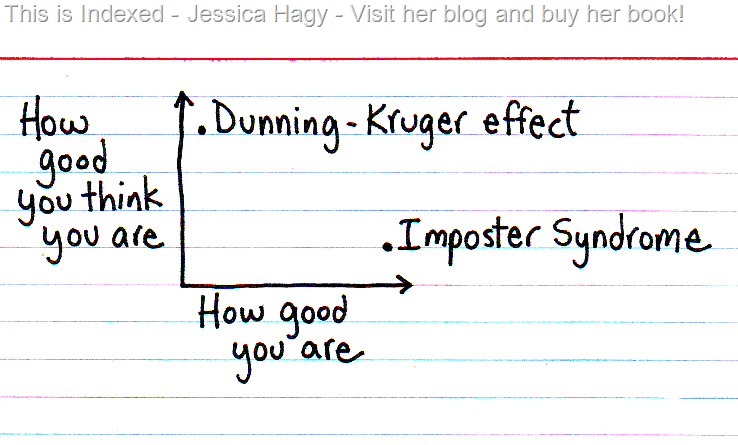Exploring Impostor Syndrome in Technology - SXSW '15
I've written before about the idea of Imposter Syndrome or being a "Phony." It's the idea that on the surface you're an accomplished technologist but inside you're always questioning if you're really good enough. It turns out that this is SUPER common. You're not alone.
That little voice or feeling that "I can do better." Or, "I'm not 100% qualified but I think I can push through this" can sometimes be a motivator.
This wonderful index card is by Jessica Hagy of This Is Indexed. Explore her blog and book!
Remember that while you may feel like a phony, those around you who think they are awesome may not be!
The Dunning–Kruger effect is a cognitive bias in which unskilled people make poor decisions and reach erroneous conclusions, but their incompetence denies them the metacognitive ability to recognize their mistakes.
But the most important part is:
...people with true ability tended to underestimate their relative competence.
My excellent friend and very accomplished phony Chanelle Henry will be exploring these concepts on stage at SXSW 2015...if our panel is accepted!
You may have heard Chanelle on Hanselminutes Podcast episode #401 on "An Internet of Inclusion" or read her viral essay "Is it too late to be awesome?"
You can help us by quickly making a SXSW account and casting your Thumbs Up Vote (and leaving a comment) for our session proposal! Even better, tweet or blog your thoughts and encourage others to vote if you'd like to see content like this at the South By Southwest Interactive Conference.
Go read my blog post called "I'm a phony" and if it helped you, help me by voting for our session at SXSW! Thanks!
Sponsor: And a big thanks to Raygun for sponsoring the feed this week! I love Raygun and use it on all my apps. Get notified of your software’s bugs as they happen! Raygun.io has error tracking solutions for every major programming language and platform - Start a free trial in under a minute!
About Scott
Scott Hanselman is a former professor, former Chief Architect in finance, now speaker, consultant, father, diabetic, and Microsoft employee. He is a failed stand-up comic, a cornrower, and a book author.
About Newsletter
Nowadays I look at it another way: if you don't have imposter syndrome, you likely aren't learning anything new. The very fast pace of change and the requirement to constantly keep understanding new things means you invariably spend less time on one thing. That then does not give you much time to become comfortable in the subject area and the knock-on is you get the feeling when you are pressed to assert that "yes, I can deliver your requirement using this technology that I've only been using for a few weeks".
I don't necessarily think the feeling comes just from people who are naturally humble, but you do get those who don't have it and are not very humble ;-)
aka. You know nothing, Jon Snow.
Really, technology is not so very different.
HR crafting job requirements/descriptions for new job openings? Ridiculous.
In practice a good manager should realize that their job is to 'manage' you as an subject-matter expert resource; in practice most management use and treat employees as disposable tools (on both meanings of the word).
When you find a manager that makes decisions based on the team's advice and expertise -instead of telling them how to do things- you know you are lucky.
Corporate America(Earth?) is riddle with management under the Dunning-Kruger effect.
While this effect can be found at any level: ignorance + power = bad things will happen
There is a risk here that someone less-than-competent starts believing that, deep-down, he's is really awesome because he just thinks he's suffering from impostor syndrome.
Isn't believing that you have impostor syndrome actually self-defeating?
It's sad, it makes no sense, but is my perception of the reality.
I would like to feel for me at least a bit of the respect and admiration that my coworkers have for me and my professional work. I would like to see a small percentage of that personal appearance reflected in my own mirror.
I'm convinced that my worst enemy it's me, or lives inside of me.
Anyway, it's a monster.
Greetings from Argentina.
I go through mild phases of it. Sometimes I know I am good at a task, other times I know I'm not, but occasionally I get times where others say I am good at a task and I don't feel as though I am.
At the end of the day, the idea of being an imposter is because you worry what others are perceiving.
In 1999, I was a VP/CIO and in 2000 I was unemployed for 8 months. I took that time to retool and started my adventures into DotNet and Visual Studio. It wasn't long before my new skills were harvested. During that time I worked with a compulsive determination to not fail. Eventually I found myself blogging and pushing beyond what I could learn from books and online.
Now, I just want to study, teach and contribute to projects that make the world a little better. I am so grateful that this industry has supported me and my family for over 30 years. "Fake it until you make it" is a great mantra for anyone approaching a new endeavor. It worked when we wanted to learn how to speak, and it will work with anything for which we are determined to succeed.
Nevermind, now that I see that term, Dunning-Kruger's, I'm sure they'll all love it if they are the first ones being it.
Comments are closed.

